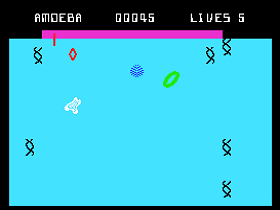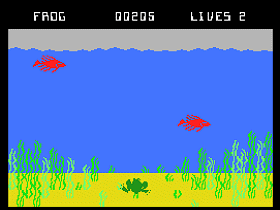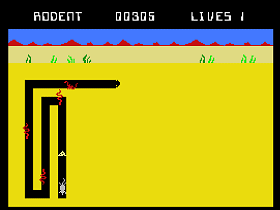 The Game: It can take billions of years for a microbe to evolve into a race of creatures crossing the stars, except in the confines of the Colecovision universe, where it can take mere minutes. Players control an amoeba, avoiding predators on the screen except the DNA needed to grow and evolve. Through several successive stages, avoiding aggressors and gathering material for future growth is the only way to stay alive and evolve, from amoeba to frog to rodent to beaver to gorilla to human space warrior. (Sydney, 1983)
The Game: It can take billions of years for a microbe to evolve into a race of creatures crossing the stars, except in the confines of the Colecovision universe, where it can take mere minutes. Players control an amoeba, avoiding predators on the screen except the DNA needed to grow and evolve. Through several successive stages, avoiding aggressors and gathering material for future growth is the only way to stay alive and evolve, from amoeba to frog to rodent to beaver to gorilla to human space warrior. (Sydney, 1983)
Memories: An unusual game by any measure, Evolution isn’t content simply to put the player through several levels of difficulty; it guides the player through entire stages of biological life. Already released on the Apple II and Commodore 64, Evolution was really a computer game at heart. Even though action and quick reflexes are required to survive, Evolution is really a game of patience and perseverance.
 It also looks a lot better here than it does in any of its computer iterations, though that’s not saying a lot; on the Apple II, C64 and PC, Evolution does things with simple graphics (occasionally even text graphics) and gigantic, chunky letters. With the Colecovision‘s video chip at their disposal, the designers seem to have tried to make it look a bit more upscale.
It also looks a lot better here than it does in any of its computer iterations, though that’s not saying a lot; on the Apple II, C64 and PC, Evolution does things with simple graphics (occasionally even text graphics) and gigantic, chunky letters. With the Colecovision‘s video chip at their disposal, the designers seem to have tried to make it look a bit more upscale.
Unlike the ubiquitous Life game, where “players” really just set variables and sit back to watch their creations flourish or starve, Evolution gives players a more direct stake in the action. Its evolutionary chain is a little bit oversimplified, with the sudden leap from “gorilla” to “gun-toting alien hunter” being the most illogical of Evolution‘s quantum leaps. Even Darwin might be scratching his head on that one.
 But for whatever quirks and faults the game may have, it’s worth applauding just for the unusual, out-of-left-field concept. There are heaps of games requiring the player to
But for whatever quirks and faults the game may have, it’s worth applauding just for the unusual, out-of-left-field concept. There are heaps of games requiring the player to  gather specific objects to advance; here the reward isn’t the same environment with the difficulty ratcheted up, but practically a whole new game each time. It lacks some of the “twitch factor” expected of a console game, but the uniqueness of its premise compensates a little for that.
gather specific objects to advance; here the reward isn’t the same environment with the difficulty ratcheted up, but practically a whole new game each time. It lacks some of the “twitch factor” expected of a console game, but the uniqueness of its premise compensates a little for that.
